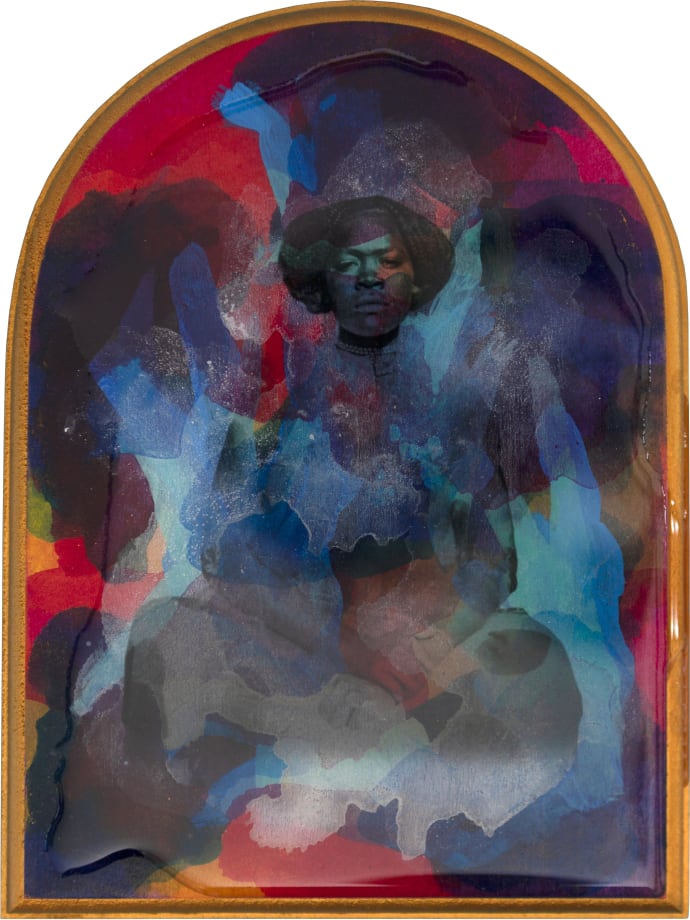Shiraz Bayjoo’s first solo show with Ed Cross Fine Art – Apart Bez, Tu Korek – considers the implications of social and colonial hierarchies on both communities and environments of the Indian Ocean. Across the exhibition’s two floors, the artist presents painting, photography, sculpture and installation to articulate his ongoing multidisciplinary and research-based practice.
Apart Bez, Tu Korek grapples with the visual language of European status imposed on native populations and reconfigured by Bayjoo materially and conceptually. The exhibition’s archival genealogies stem from Malagasy culture as well as Bayjoo’s own Mauritian heritage; its Creole title, meaning ‘everything’s fine except for the fuckery’, wryly illuminates the exploitation which brought the region’s linguistic diversity into being.
For the exhibition, Bayjoo presents a series of new ceramic works: Coral Island. Characteristic of his practice in their layering of meaning and material, each object is detailed with a sketch made by Dutch sailors and reinterpreted by printers who made them into lithographs before finding their final incarnation beneath Bayjoo’s fired glaze. Representing the unfamiliar lands, creatures and abundant resources encountered on the sailors’ journeys to and around Africa, the small drawings are nestled in textured clay and moulded into ornate frames nodding to Europe’s colonial opulence. Hung in small arrangements to enhance the intimacy of the individual works, Coral Island runs through the exhibition both spatially and conceptually: here, the natural world is just as much subject to colonialism’s heavy exploitation as human populations.
Bayjoo’s experiments with scale and significance extend to En Cours, a series of paintings emerging from his Politique de Races panels (2018) and ranging from jewel-like keepsakes to larger triptychs the size of altarpieces. Recuperating images of Malagasy royalty and society from French colonial archives, the series highlights the powerful and dignified presences of historically othered subjects through a multi-layered artistic technique, thus reversing the archival process by which such imagery has been wielded to oppress.
Bayjoo positions the social technology of textiles – from traditional Kanga cloths to the ostentatious European drapery of flags and military standards – in conversation with the leap in maritime technology that facilitated the first colonial expeditions. San Vizyon, a large triangular swathe of Panama woven fabric trimmed with gold tassels, features three young individuals; their eye contact with the photographer transcends space and material to meet the viewer’s own gaze. The encounter trills with snapshot immediacy, vibrating against the solemnity suggested by its royal medium.
San Vizyon’s trio are pictured on a canoe, likely made of East African hardwood – perhaps Sapele, from which Bayjoo has constructed the neighbouring Sambo sculpture. For all its maritime inferences – Sambo’s Kangas might be mistaken for sails, its beams for masts – the installation foregrounds sacredness over seafaring. Hanging from Sambo’s Sapele struts, small objects recall Coral Island and En Cours, articulating intimate presences and places within a revered space. Shrine-like, Sambo invites the viewer to imagine a hand at work beyond the artist’s: that of a devotee, a mourner or a celebrant.
Apart Bez, Tu Korek examines what materials themselves are able to testify to; the ideas they might be able to articulate which evade their more mediated subjects. From considering the manipulation of visual languages imposed by colonising cultures, Bayjoo’s work moves to investigate the possibilities of reformulating, setting new terms for its own thinking. Apart Bez, Tu Korek begins with the ‘archive’, but its closing remarks offer new articulations – of meaning, of visuality, of materiality – in the present.
The exhibition was developed by Shiraz Bayjoo in curatorial conversation with Ilaria Conti, who has written an accompanying text for the project.
Shiraz Bayjoo is a contemporary multi-disciplinary artist who works with film, painting, photography, performance, and installation. His research-based practice focuses on personal and public archives addressing cultural memory and postcolonial nationhood in a manner that challenges dominant cultural narratives. Bayjoo has exhibited with the Institute of International Visual Arts, London; New Art Exchange, Nottingham; 5th Edition Dhaka Art Summit; 14th Biennale of Sharjah; 13th Biennale of Dakar; and 21st Biennale of Sydney. Bayjoo is a recipient of the Gasworks Fellowship and the Arts Council of England. He is an artist in residence at the Delfina Foundation, and has recently been awarded an Artist Research Fellowship with the Smithsonian.
As an independent curator, Ilaria Conti focuses on research-based practices engaging with decolonial epistemologies and articulating new relationships between institutional infrastructures, communal knowledge, and civic agency. Most recently she served as Research Curator at the Centre Pompidou, where she was part of the curatorial team of Cosmopolis, a multi-year platform devoted to research-based art. Previously, she served as Exhibitions and Programs Director at CIMA New York; Assistant Curator of the 2016 Marrakech Biennale; and Samuel H. Kress Interpretive Fellow at the Metropolitan Museum of Art, among other positions. She is the Vice-President of the African Art in Venice Forum.
Since 2009, Ed Cross Fine Art has worked with emerging and established artists across and beyond the African diaspora. The gallery seeks to stage conversations – between practitioners, international audiences and as guided by its artists – to amplify voices historically silenced, and to create space for their independent development.
For more information, artist interview requests or high-res images, please contact Emily Watkins (emily@edcrossfineart.com)

